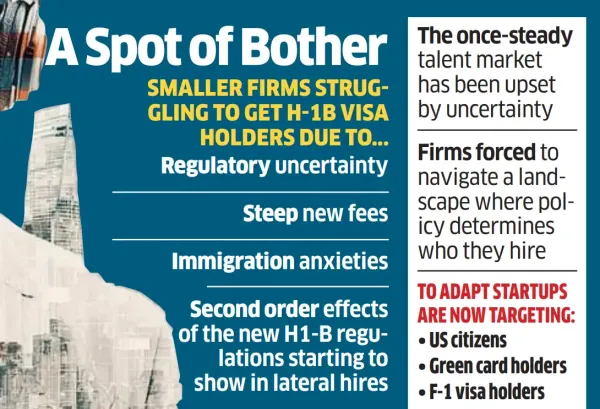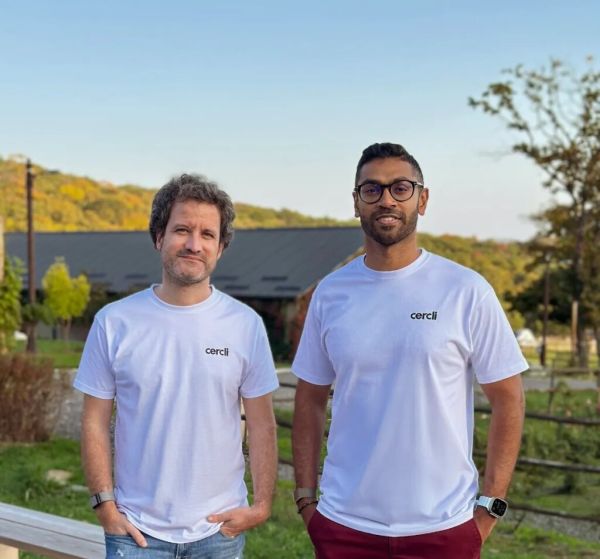Artificial intelligence startups led by Indian entrepreneurs are struggling to attract tech talent for US-based roles.
A cocktail of regulatory uncertainty, steep new fees and immigration anxieties has spooked H-1B visa holders and made them reluctant to switch from big tech firms to smaller, riskier ventures, multiple founders told ET. They said the second order effects of the new H1-B regulations are starting to show even in lateral hires — a segment relatively less affected by policy flux.
“We are hiring for machine learning and AI roles in the (San Francisco) Bay Area. Two applicants — one from Amazon and the other from Google — backed out,” a startup founder said. “These were lateral hires, unaffected by the $100,000 visa fee, but candidates are wary of changes under the present dispensation.”

The Donald Trump administration on September 19 imposed a $100,000 one-time fee on companies sponsoring new H-1B visas. Even though the fee applies only to fresh applications and not movement between employers of existing H-1B holders, ambiguity about extension of the fee and the administration’s abrupt policy changes is prompting many workers to play safe and stay put at larger firms rather than risk moving to a startup.
Also Read: Will the $100,000 H-1B fee affect you? Three key points from the US clarification
If an H-1B visa holder receives a job offer from a US employer willing to sponsor the visa, the employer must file an H-1B petition with the US Citizenship and Immigration Services, accompanied by a Labor Condition Application and supporting documents. The associated costs are typically minimal and limited to filing and legal fees. “The $100,000 fee does not apply to such H-1B transfers,” Sukanya Raman, India head at Davies & Associates, told ET.
Another startup founder based in San Francisco said employees are hanging on to big tech firms because people flying out of the US are worried they may not be allowed back when they return, especially if they are on an H-1B sponsored by a startup versus a large firm.
Startups have always appealed to those with a higher risk appetite. Talented AI engineers often crave the creative freedom that large firms cannot offer. “Some will still take the leap,” a founder said. “But there’s now a cohort that simply won’t work with smaller companies in this climate.”
Talent pipeline
To adapt, startups are increasingly targeting US citizens, green card holders and F-1 visa holders — students with temporary work authorisation through the Optional Practical Training programme — for technical roles. These positions typically demand hands-on expertise in generative AI, coding, and core engineering, hence the firms often require one or two key specialists rather than full teams.
Founders told ET that sourcing such talent has become challenging in the current environment. “We are competing for people who have four-five offers from larger companies, with bigger pay packages,” one founder said.
ET reported on September 22 that some startups were rethinking their hiring strategy after President Trump announced the H-1B application fee. Others saw minimal impact, noting that they were not encumbered by it and are willing to bear the H-1B sponsorship costs.
The policy convulsions come against the backdrop of large-scale layoffs at Amazon, Google, Meta and Microsoft, mainly in go-to-market (GTM) functions rather than technical roles. One AI founder with operations in Hyderabad and New Jersey noted that while those with steady jobs are unlikely to leave, the availability of talent in the US is high due to these layoffs.
The US currently has a little over 510,000 active experienced engineers, according to data from specialist staffing firm Xpheno. While it may be difficult to establish how many of them are on an H-1B, in the last year alone over 15,000 engineers from outside the US have moved into this pool.
"In the current state of volatility around H-1B rules, two possibilities arise: one is easy access to talent that a current H-1B sponsor is trying to offload. The other is that workers become guarded and hold on to their current jobs," said Xpheno cofounder Kamal Karanth.
Investors add that the talent crunch is uneven. “AI talent will hunker down in the US for some time due to uncertainty,” said Krishna Mehra, partner at Elevation Capital. "But there’s plenty of GTM talent and it’s easy to hire them right now,” he said.
A partner at another AI and SaaS-focussed fund concurred. “The typical playbook of Indian startups in the US is to get high-quality GTM resources there, since their customer base is largely in the US. Product and tech roles are hired in India,” he said, requesting anonymity.
All this uncertainty has upset a once-steady talent market, and companies are learning to navigate a landscape where immigration policy — and not their requirement — determines who they hire.
Also Read: Big US court relief for H-1B spouses, but worries remain
A cocktail of regulatory uncertainty, steep new fees and immigration anxieties has spooked H-1B visa holders and made them reluctant to switch from big tech firms to smaller, riskier ventures, multiple founders told ET. They said the second order effects of the new H1-B regulations are starting to show even in lateral hires — a segment relatively less affected by policy flux.
“We are hiring for machine learning and AI roles in the (San Francisco) Bay Area. Two applicants — one from Amazon and the other from Google — backed out,” a startup founder said. “These were lateral hires, unaffected by the $100,000 visa fee, but candidates are wary of changes under the present dispensation.”

The Donald Trump administration on September 19 imposed a $100,000 one-time fee on companies sponsoring new H-1B visas. Even though the fee applies only to fresh applications and not movement between employers of existing H-1B holders, ambiguity about extension of the fee and the administration’s abrupt policy changes is prompting many workers to play safe and stay put at larger firms rather than risk moving to a startup.
Also Read: Will the $100,000 H-1B fee affect you? Three key points from the US clarification
If an H-1B visa holder receives a job offer from a US employer willing to sponsor the visa, the employer must file an H-1B petition with the US Citizenship and Immigration Services, accompanied by a Labor Condition Application and supporting documents. The associated costs are typically minimal and limited to filing and legal fees. “The $100,000 fee does not apply to such H-1B transfers,” Sukanya Raman, India head at Davies & Associates, told ET.
Another startup founder based in San Francisco said employees are hanging on to big tech firms because people flying out of the US are worried they may not be allowed back when they return, especially if they are on an H-1B sponsored by a startup versus a large firm.
Startups have always appealed to those with a higher risk appetite. Talented AI engineers often crave the creative freedom that large firms cannot offer. “Some will still take the leap,” a founder said. “But there’s now a cohort that simply won’t work with smaller companies in this climate.”
Talent pipeline
To adapt, startups are increasingly targeting US citizens, green card holders and F-1 visa holders — students with temporary work authorisation through the Optional Practical Training programme — for technical roles. These positions typically demand hands-on expertise in generative AI, coding, and core engineering, hence the firms often require one or two key specialists rather than full teams.
Founders told ET that sourcing such talent has become challenging in the current environment. “We are competing for people who have four-five offers from larger companies, with bigger pay packages,” one founder said.
ET reported on September 22 that some startups were rethinking their hiring strategy after President Trump announced the H-1B application fee. Others saw minimal impact, noting that they were not encumbered by it and are willing to bear the H-1B sponsorship costs.
The policy convulsions come against the backdrop of large-scale layoffs at Amazon, Google, Meta and Microsoft, mainly in go-to-market (GTM) functions rather than technical roles. One AI founder with operations in Hyderabad and New Jersey noted that while those with steady jobs are unlikely to leave, the availability of talent in the US is high due to these layoffs.
The US currently has a little over 510,000 active experienced engineers, according to data from specialist staffing firm Xpheno. While it may be difficult to establish how many of them are on an H-1B, in the last year alone over 15,000 engineers from outside the US have moved into this pool.
"In the current state of volatility around H-1B rules, two possibilities arise: one is easy access to talent that a current H-1B sponsor is trying to offload. The other is that workers become guarded and hold on to their current jobs," said Xpheno cofounder Kamal Karanth.
Investors add that the talent crunch is uneven. “AI talent will hunker down in the US for some time due to uncertainty,” said Krishna Mehra, partner at Elevation Capital. "But there’s plenty of GTM talent and it’s easy to hire them right now,” he said.
A partner at another AI and SaaS-focussed fund concurred. “The typical playbook of Indian startups in the US is to get high-quality GTM resources there, since their customer base is largely in the US. Product and tech roles are hired in India,” he said, requesting anonymity.
All this uncertainty has upset a once-steady talent market, and companies are learning to navigate a landscape where immigration policy — and not their requirement — determines who they hire.
Also Read: Big US court relief for H-1B spouses, but worries remain





